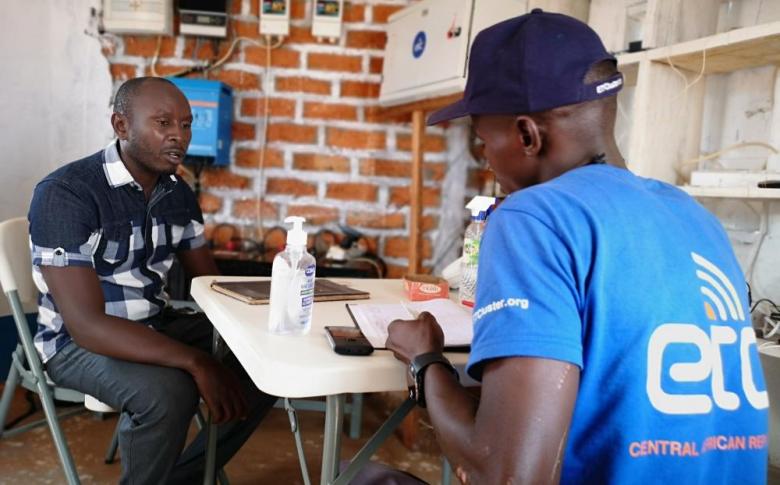Good call: WFP helps people displaced by conflict stay in touch

By Elizabeth Millership
This story was originally published on WFP.org
The emotion is visible on Audrey’s face as she hangs up the phone. She’s just spoken to her uncle – one of her only remaining family members – for the first time in years.
Audrey was just 21 year old when her family were separated while fleeing armed conflict in Bria, eastern Central African Republic (CAR), in 2017. Hundreds of people were killed, including Audrey’s parents. Many more were displaced.
“We ran together as a family, but half of them got separated and ended up in a different place to live,” she says. “Some of us – including my two sisters and brother – came here to the camp.”
Almost all the residents of Bria were forced to flee the violence that has ravaged CAR since 2013.
Today, the World Food Programme-led Emergency Telecommunications Cluster (ETC) is tackling such issues in Bria by setting up phone booths and charging stations in a community centre inside the camp for internally displaced people, known as PK3. Safe and secure, anyone in the camp can visit the centre to call family, request assistance, and charge their devices free of charge.
“I came to call my uncle in Bangui to get news and to ask if me and my little brother can go stay with him,” Audrey explains.
She would have made this call a long time ago – if she’d had access to a phone. In Bria, half the population struggles to access information. Phones are the only way to contact displaced families, yet only a fifth of the population own a mobile phone.
Women have the lowest rates of access to mobile phones and are vulnerable to harassment when using paid calling facilities in the camp.
Lack of access to information is crippling for the 39,000 displaced people in PK3 – many of whom intend to return home one day. Monitoring the movements of armed groups when planning a journey can mean the difference between life and death; and between knowing where to find WFP food distribution sites and having no food on the table.
Misinformation takes on a life of its own in communities that lack access to communications technologies. The consequences can be devastating.
In the booth next to Audrey’s, a young father called Joseph is calling his cousin in a town 1,000 km away for news about family.
“It’s the first time I’ve been able to speak to my cousin in many years, as I don’t have a phone,” he says. “We have been disconnected from our families for years because of the conflict. I was surprised and happy to see this kind of service in the camp. For us, this is the only chance to get information”.
Joseph was a gemstone miner in the outskirts of N’Dele before violence forced him to travel with his wife and children to Bria in 2019. His youngest child, just 4 months old, was born in the camp.
Now Joseph’s a regular at the ETC centre, using the charging station for his radio. “We need it to hear news,” he says.
Charging services are available for a fee in the market, he explains, but some vendors charge full price and fail to completely charge devices. He not only appreciates getting services for free from the ETC – which means he can save money for family necessities – he also likes the sense of security the community centre offers.
There is also a facility for making complaints confidentially via the UNICEF-led inter-agency feedback mechanism, a platform automated by the ETC.
Anonymous feedback about humanitarian assistance is recorded on a tablet used by ETC’s partner, INTERSOS – a nongovernment humanitarian organization.
Feedback from people in the camp is then directed to the most relevant humanitarian partner to act upon.
Assessments show that almost all communities in CAR report minimal interaction with humanitarian workers and that only one in 20 people are aware of a helpline for humanitarian assistance.
Having a simple mechanism to collect, log and follow up on complaints opens the potential to change the lives of displaced people like Audrey and Joseph.
Communication is a powerful thing – especially for people living with uncertainty.
Leaving the ETC phone booth, Audrey exudes a sense of hope as she walks out into the heart of the bustling camp, excited to tell her brother that she contacted family. After four years living in the Bria camp, they can now start planning the 570 km journey to reunite with their uncle in Bangui.